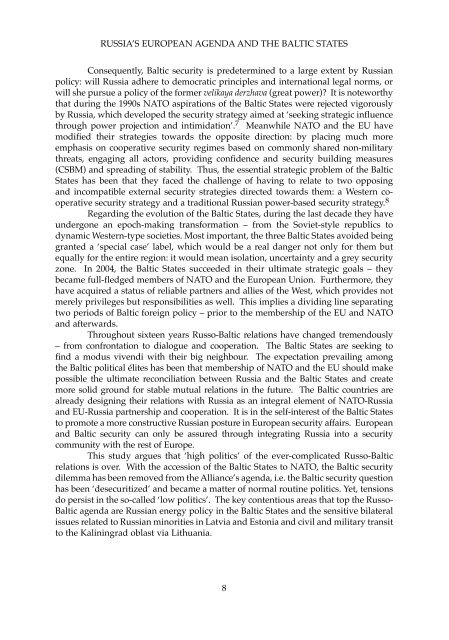Russia's European Agenda and The Baltic States - Defence ...
Russia's European Agenda and The Baltic States - Defence ...
Russia's European Agenda and The Baltic States - Defence ...
Create successful ePaper yourself
Turn your PDF publications into a flip-book with our unique Google optimized e-Paper software.
RUSSIA’S EUROPEAN AGENDA AND THE BALTIC STATES<br />
Consequently, <strong>Baltic</strong> security is predetermined to a large extent by Russian<br />
policy: will Russia adhere to democratic principles <strong>and</strong> international legal norms, or<br />
will she pursue a policy of the former velikaya derzhava (great power) It is noteworthy<br />
that during the 1990s NATO aspirations of the <strong>Baltic</strong> <strong>States</strong> were rejected vigorously<br />
by Russia, which developed the security strategy aimed at ‘seeking strategic influence<br />
through power projection <strong>and</strong> intimidation’. 7 Meanwhile NATO <strong>and</strong> the EU have<br />
modified their strategies towards the opposite direction: by placing much more<br />
emphasis on cooperative security regimes based on commonly shared non-military<br />
threats, engaging all actors, providing confidence <strong>and</strong> security building measures<br />
(CSBM) <strong>and</strong> spreading of stability. Thus, the essential strategic problem of the <strong>Baltic</strong><br />
<strong>States</strong> has been that they faced the challenge of having to relate to two opposing<br />
<strong>and</strong> incompatible external security strategies directed towards them: a Western cooperative<br />
security strategy <strong>and</strong> a traditional Russian power-based security strategy. 8<br />
Regarding the evolution of the <strong>Baltic</strong> <strong>States</strong>, during the last decade they have<br />
undergone an epoch-making transformation – from the Soviet-style republics to<br />
dynamic Western-type societies. Most important, the three <strong>Baltic</strong> <strong>States</strong> avoided being<br />
granted a ‘special case’ label, which would be a real danger not only for them but<br />
equally for the entire region: it would mean isolation, uncertainty <strong>and</strong> a grey security<br />
zone. In 2004, the <strong>Baltic</strong> <strong>States</strong> succeeded in their ultimate strategic goals – they<br />
became full-fledged members of NATO <strong>and</strong> the <strong>European</strong> Union. Furthermore, they<br />
have acquired a status of reliable partners <strong>and</strong> allies of the West, which provides not<br />
merely privileges but responsibilities as well. This implies a dividing line separating<br />
two periods of <strong>Baltic</strong> foreign policy – prior to the membership of the EU <strong>and</strong> NATO<br />
<strong>and</strong> afterwards.<br />
Throughout sixteen years Russo-<strong>Baltic</strong> relations have changed tremendously<br />
– from confrontation to dialogue <strong>and</strong> cooperation. <strong>The</strong> <strong>Baltic</strong> <strong>States</strong> are seeking to<br />
find a modus vivendi with their big neighbour. <strong>The</strong> expectation prevailing among<br />
the <strong>Baltic</strong> political élites has been that membership of NATO <strong>and</strong> the EU should make<br />
possible the ultimate reconciliation between Russia <strong>and</strong> the <strong>Baltic</strong> <strong>States</strong> <strong>and</strong> create<br />
more solid ground for stable mutual relations in the future. <strong>The</strong> <strong>Baltic</strong> countries are<br />
already designing their relations with Russia as an integral element of NATO-Russia<br />
<strong>and</strong> EU-Russia partnership <strong>and</strong> cooperation. It is in the self-interest of the <strong>Baltic</strong> <strong>States</strong><br />
to promote a more constructive Russian posture in <strong>European</strong> security affairs. <strong>European</strong><br />
<strong>and</strong> <strong>Baltic</strong> security can only be assured through integrating Russia into a security<br />
community with the rest of Europe.<br />
This study argues that ‘high politics’ of the ever-complicated Russo-<strong>Baltic</strong><br />
relations is over. With the accession of the <strong>Baltic</strong> <strong>States</strong> to NATO, the <strong>Baltic</strong> security<br />
dilemma has been removed from the Alliance’s agenda, i.e. the <strong>Baltic</strong> security question<br />
has been ‘desecuritized’ <strong>and</strong> became a matter of normal routine politics. Yet, tensions<br />
do persist in the so-called ‘low politics’. <strong>The</strong> key contentious areas that top the Russo-<br />
<strong>Baltic</strong> agenda are Russian energy policy in the <strong>Baltic</strong> <strong>States</strong> <strong>and</strong> the sensitive bilateral<br />
issues related to Russian minorities in Latvia <strong>and</strong> Estonia <strong>and</strong> civil <strong>and</strong> military transit<br />
to the Kaliningrad oblast via Lithuania.<br />
8

















